As a guinea pig owner, you want to ensure that your pet is receiving a balanced and nutritious diet. While vegetables are a crucial part of their diet, it’s essential to understand which ones are safe for them to consume. In this article, we will explore the question, ‘Can guinea pigs eat green onions?’ and provide valuable information for pet owners.
Green onions are a common vegetable in many households. They have a unique flavor and boast numerous health benefits for humans. However, when it comes to our furry friends, it’s crucial to assess the potential risks involved in introducing new foods. If you’re considering feeding your guinea pig green onions, read on to find out what you need to know.
Key Takeaways:
- Green onions are rich in vitamins and minerals, but they contain compounds that may cause digestive problems in guinea pigs.
- Guinea pigs require a high-fiber diet consisting mainly of vegetables, hay, and a limited amount of fruits.
- Introduce new foods gradually to avoid upsetting your guinea pig’s digestive system.
- Monitor your pet closely for any changes in behavior or signs of digestive discomfort after introducing new foods.
- Consult with a veterinarian if you’re unsure about the safety of a particular food for your guinea pig.
Understanding Guinea Pig Dietary Needs
Guinea pigs are delightful and friendly pets that require proper care and nutrition for optimal health. As herbivores, their diet should consist mainly of fresh vegetables, hay, and a small amount of fruits. Providing a high-fiber diet is crucial for maintaining proper digestion, so owners must understand the dietary needs of guinea pigs to keep them healthy and happy.
Hay is a very important staple in their diet, and they require an unlimited supply of fresh hay to maintain proper dental health and digestive system. Fresh vegetables, such as leafy greens like kale, spinach, or romaine lettuce, aid in fulfilling the vitamin and mineral quota. Carrots, bell peppers, and cucumbers are also healthy vegetables for guinea pigs. However, vegetables that are high in calcium, oxalates, or phosphorus should be fed in smaller quantities to avoid any health issues.
Guinea pigs should not have unlimited access to fruits due to the high sugar content, and an overconsumption of fruits can lead to obesity and other health issues. Fruits like apple, banana, and strawberry can be served in a small amount infrequently as a treat.
Nutritional Value of Green Onions
Green onions, also known as scallions, are a great source of nutritional value for humans. They contain essential vitamins such as C, K, A, and folate, as well as minerals.
However, when it comes to green onions and guinea pigs, the picture is more complicated. While these vitamins and minerals may be beneficial to guinea pigs, they also contain compounds that can pose a risk if consumed in excess.
It is important to understand the balance between the nutritional benefits and risks associated with green onions when deciding whether to feed them to your guinea pig. As with any food, moderation is key.
Vitamins and Minerals in Green Onions
The nutritional value of green onions comes largely from their vitamin and mineral content. They are rich in vitamin C, an important antioxidant that boosts the immune system and aids in tissue repair. Vitamin K helps with blood clotting and bone health. Vitamin A plays an important role in eyesight, skin health, and immune function. Folate is essential for cell growth and development.
In addition to vitamins, green onions are a good source of minerals such as calcium, iron, and potassium. These minerals play various roles in the body, from maintaining healthy bones and teeth to regulating blood pressure.
Potential Risks of Feeding Green Onions to Guinea Pigs
Apart from their nutritional value, green onions contain oxalates and thiosulphates, which can lead to digestive issues when consumed in large quantities, causing an upset stomach, bloating, or diarrhea in guinea pigs. Therefore, feeding green onions in moderation is crucial to minimize the risks and ensure the overall well-being of your pet.
It is always better to prioritize safer vegetable options that align with guinea pigs’ dietary needs. As shown in the nutritional value of green onions, they contain some essential nutrients that are good for your pet’s health, but the potential risks associated with feeding them outweigh the benefits.
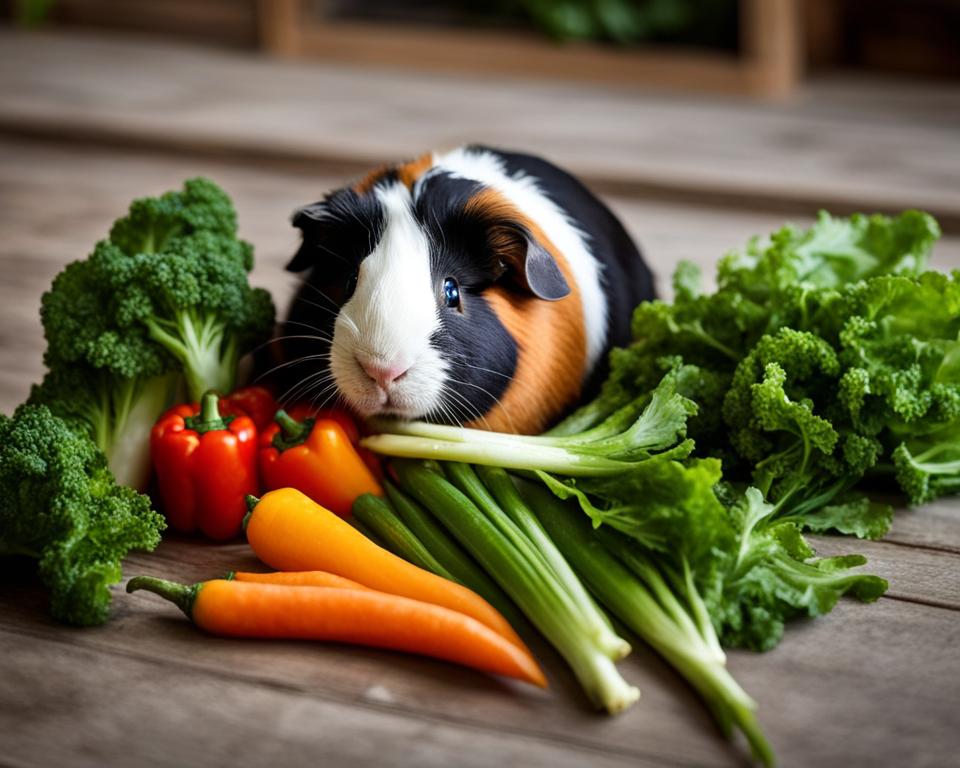
How to Feed Green Onions Safely to Guinea Pigs
If your pet enjoys the occasional treat of green onions, it’s essential to limit their intake. A few small pieces of green onions as an occasional treat may be safe for most guinea pigs. However, closely monitor their reaction and immediately stop feeding if you notice any digestive discomfort, such as diarrhea, vomiting, or loss of appetite.
Keep in mind that green onions should not be a staple in your pet’s diet, and you should avoid feeding them frequently or in large amounts. Overfeeding your pet can lead to health issues as guinea pigs have highly sensitive digestive systems.
Safe Quantity of Green Onions for Guinea Pigs
If you are considering giving your guinea pig green onions, it is important to do so in moderation. Giving small pieces of green onion as an occasional treat should be safe for your pet. However, keep an eye on your guinea pig’s digestion and look for any signs of discomfort, such as bloating or diarrhea.
Note: It is important to keep in mind that green onions should not be a staple in your guinea pig’s diet. They should only be given as a small treat, and other vegetables should be the primary source of their nutrition.
A few safer alternatives to green onions include leafy greens like kale, spinach, or romaine lettuce. Carrots, bell peppers, and cucumbers are also good choices to include in their diet.
To maintain your guinea pig’s health and well-being, it is important to provide them with a balanced diet and consult a veterinarian when introducing new foods. Remember to always prioritize the health of your furry friend!
Healthier Alternatives to Green Onions for Guinea Pigs
While green onions can be a tasty treat for guinea pigs when given in moderation, it’s important to consider safer and healthier alternatives. Leafy greens such as kale, spinach, and romaine lettuce are a great source of nutrition for your furry friend. Carrots, bell peppers, and cucumbers are also safe and tasty options to include in their diet. These alternatives provide essential vitamins and minerals that your guinea pig needs for optimal health, without the risk of digestive issues that green onions may pose.
Signs of Digestive Issues in Guinea Pigs
As responsible guinea pig owners, it is crucial to keep an eye out for signs of digestive issues. Guinea pigs are sensitive creatures, and even a small dietary change can lead to significant problems. Some signs of digestive issues to look out for include diarrhea, loss of appetite, bloating, gas, and changes in behavior. These issues can be a result of the consumption of green onions or any other unsuitable food.
If you observe any of these signs, it’s best to consult a veterinarian as soon as possible. Ignoring these symptoms can lead to dehydration, malnutrition, and even death in extreme cases. Prompt action not only safeguards your guinea pig’s overall health and wellbeing but also helps avoid significant veterinary expenses in the long run.
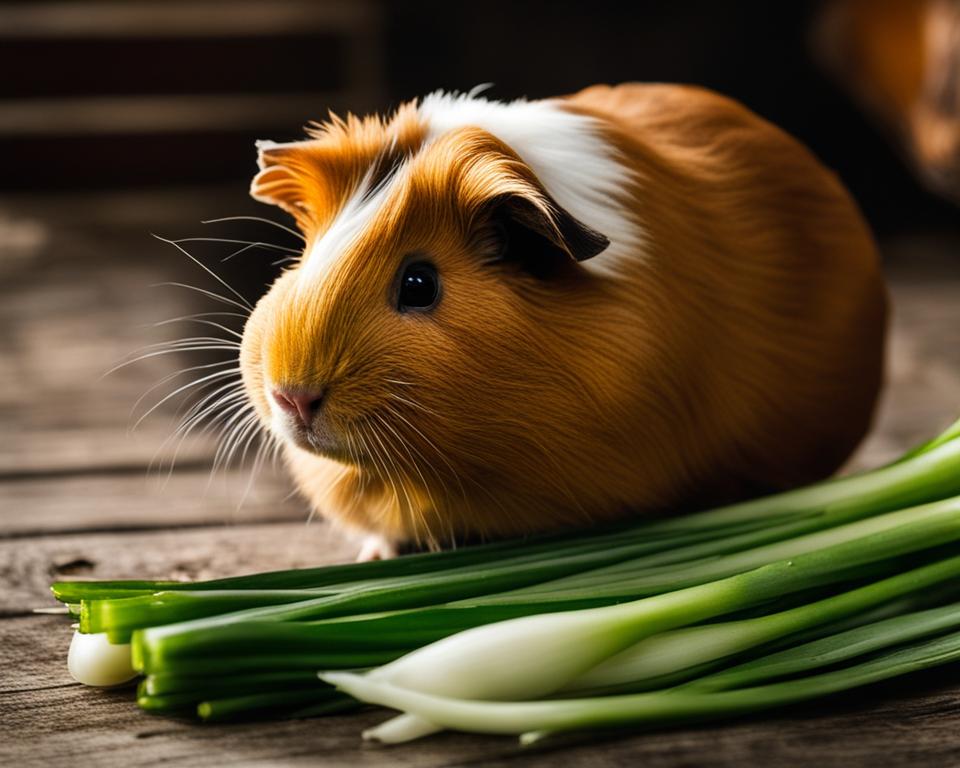
How to Help Prevent Digestive Issues
To help prevent digestive issues in your guinea pig, it is best to feed them a balanced and nutritious diet with a focus on fiber-rich vegetables, hay, and limited fruit portions. Avoid feeding your pet on human foods unless there’s enough scientific evidence to support their inclusion. Introduce new foods gradually, in small portions, and monitor your guinea pig closely for any signs of adverse reactions.
Maintaining a Balanced Diet for Guinea Pigs
Guinea pigs are herbivores, meaning their diet should primarily consist of fresh vegetables, hay, and a small amount of fruits. It is important to provide them with a balanced diet to ensure their overall health and well-being.
A balanced diet for guinea pigs includes a variety of vegetables, such as kale, spinach, or romaine lettuce, and limited amounts of fruits, such as apples or berries. Fruits should be considered as occasional treats because they have high sugar content, which can lead to obesity and dental issues if given excessively.
Their hay intake is also crucial because it promotes healthy digestion and helps wear down their teeth. Provide your guinea pig with unlimited access to plain, fresh hay, such as timothy or alfalfa hay.
Regular visits to the veterinarian can help monitor your pet’s nutritional needs and well-being. Consult with your vet if you plan to introduce new foods or if you have concerns about any changes in your pet’s diet.
Benefits of a Balanced Diet for Guinea Pigs
A balanced diet supports your guinea pig’s immune system, promotes healthy digestion, and ensures their fur and skin remain healthy. Additionally, a balanced diet can prevent various diseases, including scurvy, obesity, and dental issues.
By maintaining a healthy and balanced diet for your guinea pig, you are ensuring they live a long and happy life. Always prioritize their health and well-being by providing them with a nutritious diet.
Tips for Introducing New Foods to Guinea Pigs
Introducing new foods to guinea pigs should always be done gradually to avoid digestive issues. Start by giving small portions of the new food and monitor your pet’s response, especially when introducing foods such as green onions. If your guinea pig shows any signs of discomfort or digestive issues, stop feeding the new food and consult with a veterinarian.
- Start small: Introduce new foods in small portions.
- Observe: Monitor your guinea pig for any signs of discomfort or digestive issues.
- Be patient: Allow your pet to adjust to the new food before making it a regular part of their diet.
Conclusion
In conclusion, while green onions are technically safe for guinea pigs to consume in small quantities, the potential risks associated with their consumption make them a less than ideal choice. Guinea pigs require a high-fiber diet consisting primarily of fresh vegetables, hay, and a limited amount of fruits to maintain proper digestion and overall health. If you do decide to feed green onions to your furry friend, be sure to do so in moderation and monitor their response carefully. Ultimately, prioritizing the health and well-being of your guinea pig by providing a balanced diet and consulting a veterinarian when needed is essential to ensuring a long and happy life for your beloved pet.
FAQ
Can guinea pigs eat green onions?
Green onions should be fed to guinea pigs in moderation. While they contain vitamins and minerals, they also have compounds that can cause digestive issues if consumed in large quantities.
What are the potential risks of feeding green onions to guinea pigs?
Green onions contain oxalates and thiosulphates, which can cause upset stomach, diarrhea, or bloating in guinea pigs if consumed in excess.
How much green onion is safe for guinea pigs?
It is best to feed guinea pigs small amounts of green onions as an occasional treat. Monitor your pet closely for any signs of digestive discomfort.
What are some healthier alternatives to green onions for guinea pigs?
Leafy greens like kale, spinach, and romaine lettuce, as well as carrots, bell peppers, and cucumbers, are safer and more nutritious options for guinea pigs.
What are the signs of digestive issues in guinea pigs?
Signs of digestive issues in guinea pigs include diarrhea, loss of appetite, and changes in behavior. If your pet experiences these symptoms after consuming green onions or any other food, seek veterinary advice.
How do I maintain a balanced diet for my guinea pig?
To maintain a balanced diet for your guinea pig, provide a variety of vegetables, hay, and a limited amount of fruits. Regular veterinary check-ups can help you ensure your pet’s nutritional needs are met.
What tips can you provide for introducing new foods to guinea pigs?
When introducing new foods, including green onions, to guinea pigs, do so gradually. Start with small portions and observe their response to minimize the risk of digestive issues.

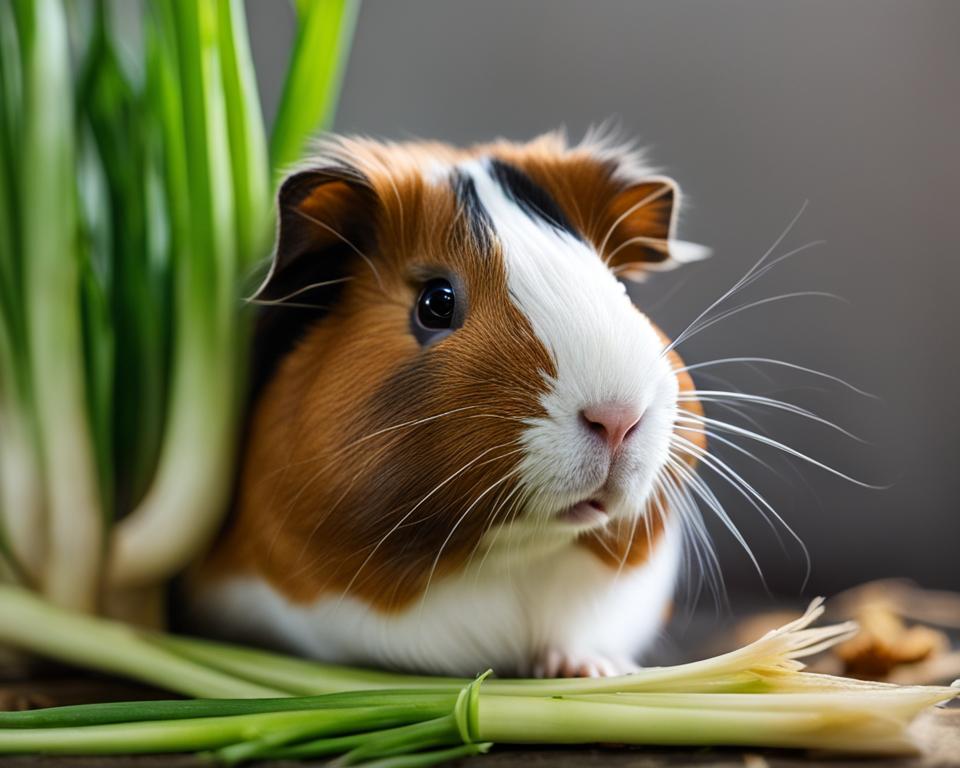
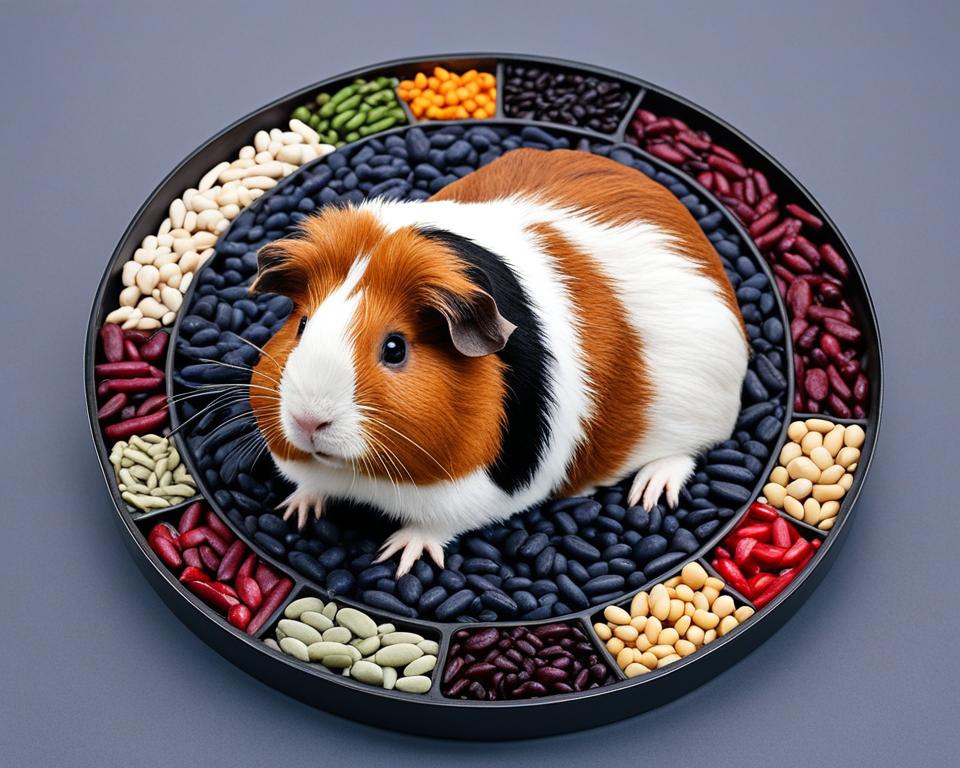
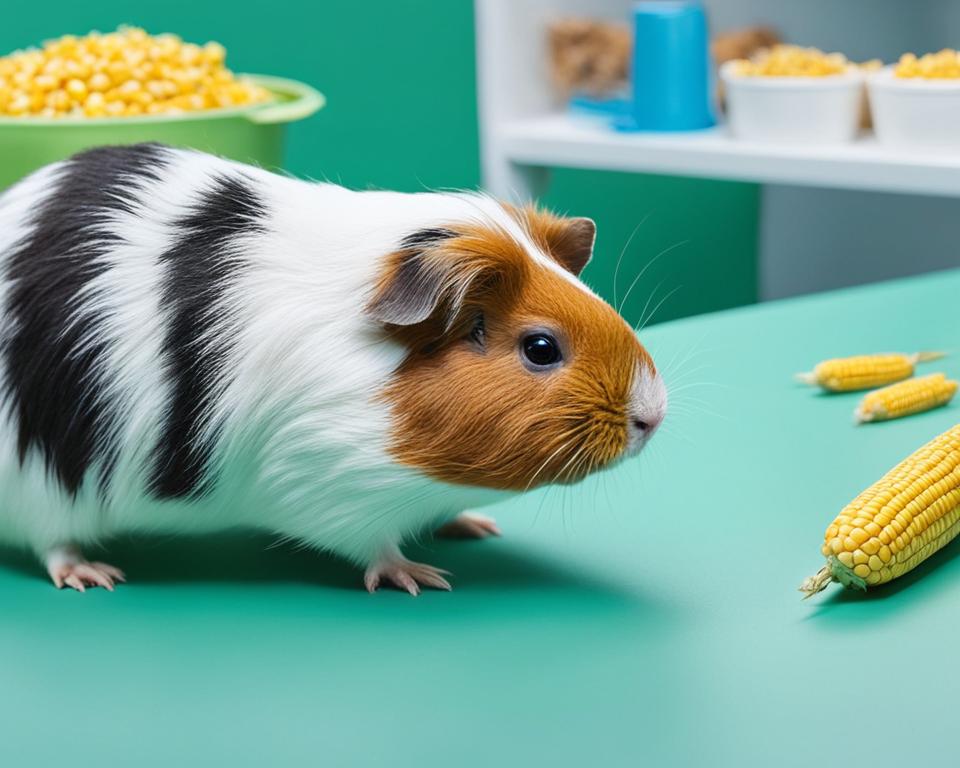
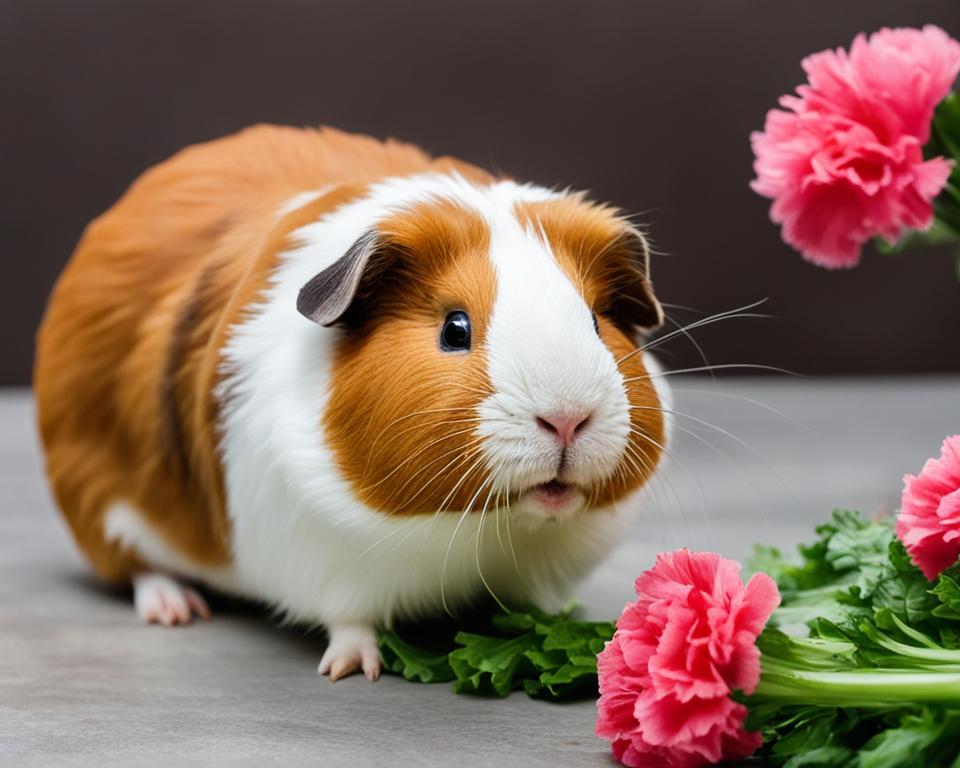
Leave a Reply